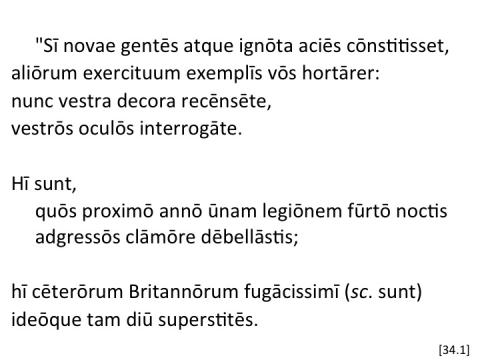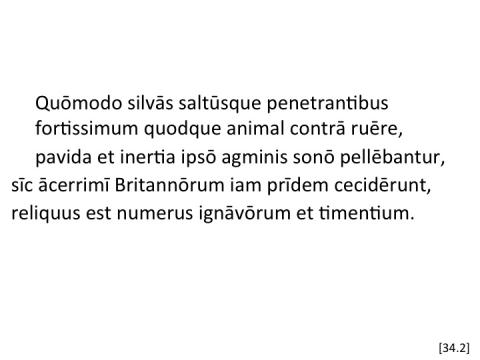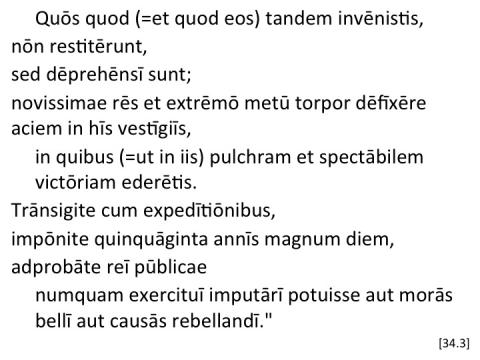Overview: "This is no new enemy; you have conquered him before. These are the cowards 'who ran away and lived to fight another day.' Fear has glued them to their tracks. Up and at them!" (Stuart); this chapter begins on f. 62r of the codex Aesinas.
34.1
sī novae gentēs: this vein of exhortation is typical of speeches of this kind. He reminds his soldiers that Romans have vanquished before Germans and Carthaginians respectively. (Gudeman)
cōnstitisset: “were marshalled against you.” (Pearce); the predicate agrees with acies, the nearer subject, which is added to gentes to signify that they were on a war footing, consisto being also a military term. See Introd. p. xxx #17. (Gudeman)
legiōnem: the ninth legion. See note on ch. 26. (Stuart)
decora: “glorious deeds.” (Pearce); i.e. victories won against them. (Gudeman)
fūrtō noctis: “by stealth at night.” The development of furtum from its original meaning of theft into that of a clandestine act or a trick is neatly paralleled by our stealth, originally signifying theft. (Stuart)
clāmōre: “by a mere shout.” (Stuart)
dēbellāstis: see note on 24.5. (Pearce)
cēterōrum ... fugācissimī: sc. sunt. (Damon); this Greek idiom ... rests on a confusion of the comparative and superlative forms of expression, "more than the rest," "most of all." See note on pudet dictu, 32.3. (Pearce); two ideas here coalesce into one, ceteris Britannorum fugaciores and omnium Britannorum fugacissimi. (Gudeman)
34.2
quō modo, etc.: quo modo (for the regular quem ad modum) ... sic is a frequent correlation in Tacitus. (Gudeman)
silvās saltūsque: this alliterative collocation is poetic and common in Vergil, but very rare in prose. (Gudeman)
penetrantibus: a concise ablative absolute. As agmen following shows, Tacitus had in mind actual experiences of the advance, not a general case of hunters entering a forest; hence, supply nobis. (Stuart) [A&G 419]; refers to Agricola and his Roman men. Tr. “with us entering.” (Jacobson); abl. absolute, or perhaps dative as transgressis in 10.4. (Pearce) [A&G 419]; sc. nobis, for, as agmen and the imperfect pellebantur seem to indicate, the illustration is supposed to represent recent experiences, here recalled to exemplify the alleged situation of the enemy. With the elliptical dative (rather than abl.) absolute, see notes on ch. 10.4; 11.3; 18.6. (Gudeman) [A&G §378]
ruēre: “charged against;” probably a perfect indicative. Some prefer to explain it as an historical infinitive. (Stuart) [A&G 463]; generally taken as aorist (the plural is not uncommon with quisque). To avoid the awkward combination of the aorist and imperfect tenses, it may perhaps be better to take ruere as historical infinitive, which is equivalent to an imperfect indicative. (Pearce) [A&G 463, 473]; the aoristic perfect is common, and with but few exceptions always found with the shorter form. On the plural after quisque, see note ch. 3.2, promptissimus quisque. (Gudeman) [A&G 473]
numerus: in a depreciatory sense, “pack, crew.” (Stuart); “the mass.” (Pearce)
34.3
quod, etc.: “as for the fact that.” (Gudeman) quōs quod ... invēnistis: suggested by ignavorum. Being ignavi they might have been expected to get out of our way. "As to your having come across them; it is not that they have made a stand, but that they have been caught in a trap." (Pearce)
novissimae rēs: “desperate straits.” (Stuart); “their extremity.” (Pearce); “extreme plight.” (Gudeman)
torpor dēfīxēre: torpor is parallel to res; together they form the subject of defixere. Torpor is an emendation for the manuscript's corpora (see line 8 of the right-hand column), which some editors (including Stuart, below) accept as the object of defixere, but this requires the excision of et and aciem. (Damon) corpora dēfīxēre: “have planted their bodies fast.” Corpora, instead of eos, heightens the contemptuous force of the remark. In their minds they would fain be elsewhere, but they are too dazed by fear to set their limbs in motion. (Stuart)
in hīs vestīgiīs = in hoc campo (see note on ch. 32.4). (Gudeman); “where they stand.” (Pearce)
ederētis: “you are to exhibit,” a final subjunctive, as in ch. 42.1. (Gudeman) [A&G 531]; final; the purpose is fate's. Edere victoriam, a bold extension of the common phrase edere spectaculum. (Pearce) [A&G 531]
trānsigite: “have done with.” (Pearce)
impōnite, etc.: "crown the campaigns of 50 years with one glorious day." Magnus dies, like our "red-letter day." The actual period was only forty-two years (43-84 CE). With the emphatic position of the predicates, see note on ch. 32.2, Romanos, and Introd. p. xxvi #3. (Gudeman)
quinquāginta: with a note of exaggeration for rhetorical effect. (Stuart); a round number for 42. The expedition of Claudius was in 43 CE. (Pearce)
morās bellī aut causās rebellandī: if the army acquits itself with honor, it will be evident that the blame for the delay in pacification rests upon those in authority. (Stuart)



